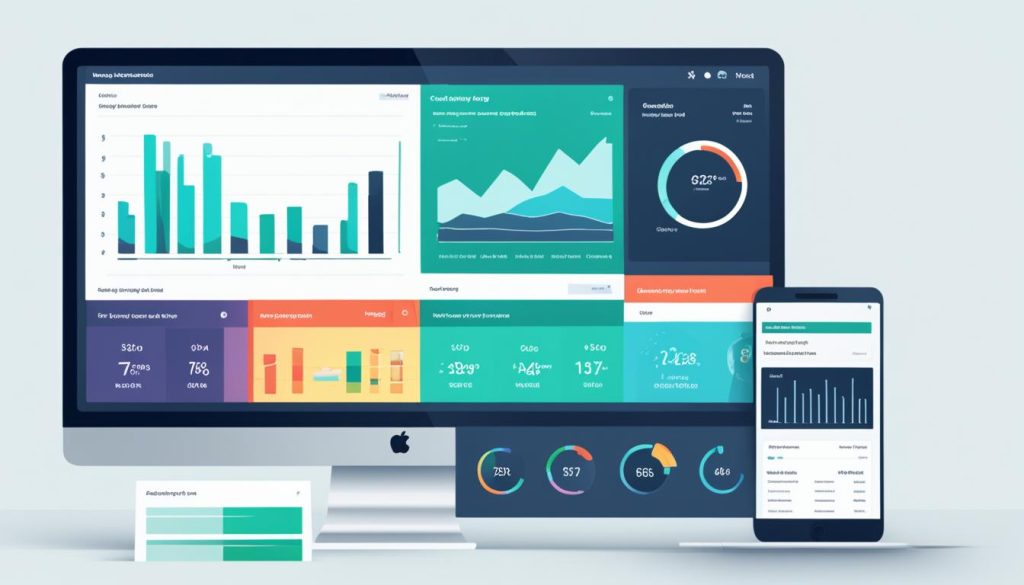Have you thought about turning your blog into a real business? Surprisingly, you can make it a reliable source of income. This can allow you to work from home, have a flexible side job, or even turn it into a full-time career. But how do you make your blog a serious business?
In this guide, I’ll show you the steps to make your blog profitable. It doesn’t matter how much you know about blogging. We’ll look at how to be seen as an expert and smart ways to make money. Get ready to see your blog’s true earning potential.
Why Start a Blog as a Real Business?
Starting a blog business opens many doors. It lets you share what you know, make money, and meet others interested in the same things. Being an online authority in your field can help you earn from your blog, making it a part-time job or your main income.
Establish Yourself as an Expert
Thanks to your blog, you can become known as a pro in what you do. When you regularly post useful stuff, people see you really understand your stuff. This builds your credibility and makes you someone others trust. And trust leads to new clients, better job prospects, and cool chances.
Earn a Part-Time or Full-Time Income
Your blog can be more than a passion; it can make money, too. You can make cash through affiliate efforts, sponsored posts, and selling stuff online. With the right approach, your blog could be a full-time job or a nice side earner.
Connect with Like-Minded People
Your blog is a gateway to a great community. Through talking with your readers, working with other pros in your field, and making friends in the blogging world, you can grow. You can find new chances to do business and support that propels your blog to success.
Choosing a Profitable Niche
Picking the right niche is essential for making your blog successful. You need a topic that you love and know well. But it should also have good monetization potential. Let’s explore how to find your ideal niche.
Find Your Passion and Expertise
First, think about what you love and what you’re good at. What topics spark your interest and drive you to learn more? These could be your areas of expertise for sharing with your readers. Blogging about things you truly care about lets you create meaningful and interesting content.
Analyze the Competition
After pinpointing potential niches, check out the competition. See what other bloggers are up to in those areas. Try to find where you can add something unique. Doing this helps you stand out and attract your desired audience through strategic market research.
Identify Monetization Opportunities
Think about how you can make money from your niche. Look into affiliate programs, sponsorships, or selling your own products. A good niche allows for various income streams, making your blog a sustainable business.
By taking these steps, you’re choosing a niche selection that matches your passion, expertise, and audience’s needs. This groundwork is key to launching a successful blog venture.

Building Your Brand and Online Presence
In today’s digital world, having a strong brand and online presence is key for your blog’s success. Your brand is how people see your business. It influences how your audience connects with you. Your online presence, which includes your website and social media profiles, is how new customers find and engage with your brand.
Your website acts as the first impression online. It shapes a visitor’s view of your brand. Your website should mirror what your brand stands for and looks like. To do this, choose a memorable domain name, design with style and function in mind, and make it easy to use. Making your website easy to find through search engines helps attract more visitors.
Working with your website, it’s crucial to keep your brand consistent on social media. Figure out which platforms your audience is on, and be active there. Post content that catches the eye and adds value. This helps show your knowledge, build trust, and grow a loyal group of supporters.
Using digital marketing methods like emails and guest posting can also boost your brand’s presence. A smart email campaign keeps your audience engaged and can bring more visits to your blog. Decent guest posts on well-known sites introduce your brand to new audiences, while also improving your SEO.
Creating a strong online presence means looking at a mix of things, like your website, social content, and what others say about you online. Keep adjusting and improving these things. This helps your blog stand out as a trusted leader, bringing in more visitors, interaction, and revenue.
Creating Valuable Content Consistently
Consistency is key for any content creator. It helps maintain a successful blog. To do this, you must first know your target audience. Understand what they like, what they struggle with, and what they enjoy. This knowledge helps you tailor your content to fit their needs.
After figuring out who you are creating for, it’s time to create an editorial calendar. This plan helps you post content regularly. It also ensures you cover topics that interest your readers. By following this calendar, you can stay organized and meet your readers’ needs.
Identify Your Target Audience
Begin by really getting to know your audience. Think about their:
- Age, gender, where they live
- What they like and what they find challenging
- Whether they prefer reading blogs, watching videos, or listening to podcasts
- Which social media platforms or emails they use
Once you deeply understand your audience, you can create content that speaks directly to them. This builds trust, shows your expertise, and grows your readership.
Plan an Editorial Calendar
An editorial calendar is vital for keeping up with content. It lets you organize when and what to post in advance. As you create your calendar, think about:
- Your main topics or themes
- How often you should publish
- The time you need for research and editing
- Various content formats to include
- Fitting content around marketing plans and important events
With your editorial calendar in place, you can keep up a steady stream of valuable content. This keeps your blog or site engaging for your readers.
https://www.youtube.com/watch?v=kb2ur6-BGDM
Blogging as a Real Business
Approaching your blog with a business mindset is vital. It shifts your focus to long-term success and steady income. By setting clear goals and crafting a content monetization strategy, your blog can grow into a real business.
Professional blogging isn’t just about content. It includes branding, marketing, product development, and managing finances. Seeing your blog as a real business unlocks its income potential, whether full-time or part-time.
- Pick your niche and target audience. Choose something you love and know well. This makes you a go-to expert and attracts the right readers.
- Map out your content strategy. Make a calendar, write valuable posts, and keep a steady schedule.
- Use monetization strategies such as affiliate marketing and selling digital items. This diversifies your income sources.
- Employ email marketing to connect with your readers. Gather emails and share news, exclusive content, and deals.
- Focus on SEO and social media to boost your blog’s visibility. This attracts more visitors naturally.
Seeing your blog as a professional business opens up growth opportunities. Keep improving and offering value to your readers. With the right business mindset and strategy, your blog will flourish and reward your efforts.

| Key Metrics | Financial Samurai Blog |
|---|---|
| Monthly Page Views | 1,200,000 |
| Email Subscribers | 50,000 |
| Initial Setup Costs | $2,000 |
| Current Monthly Costs | $17.95 |
Adopting a professional blogging mindset turns your blog into a successful real business. It ensures a steady income. Focus on audience value and keep growing as a professional blogger.
Monetization Strategies for Your Blog
Exploring different ways to make money from your blog is key. You can use affiliate marketing, sponsored posts, or sell digital products. These methods can help you create a steady flow of income from your site.
Affiliate Marketing
Affiliate marketing lets you earn money by promoting other companies’ products. You make a commission if your readers buy those products. This way, you earn money while also helping your audience find useful items.
Sponsored Content and Advertising
Selling sponsored content and ads can also bring in money. Brands pay you to showcase their products, reaching your reader base. This allows you to make money without compromising on your blog’s authenticity.
Selling Digital Products
Create and sell your digital items, like ebooks or courses, for another income source. This approach not only adds to your income but also builds your credibility. It shows you’re an expert in your niche.
| Monetization Strategy | Potential Revenue | Key Considerations |
|---|---|---|
| Affiliate Marketing | Commissions on sales | Select relevant affiliate programs, disclose partnerships, and integrate promotions naturally |
| Sponsored Content and Advertising | Flat-rate payments or revenue share | Maintain editorial integrity, create high-quality branded content, and optimize ad placement |
| Selling Digital Products | One-time or recurring payments | Identify your audience’s pain points, create valuable products, and market effectively |

By using these methods together, you can turn your blog into a successful business. Keep testing different ideas, and always look for ways to improve. This persistence will help you reach your financial goals.
Leveraging Email Marketing for Success
Email marketing is a potent tool for bloggers. It helps them create a loyal base and boost sales through their blogs. By working on your email list and engaging your audience, you can take steps towards success.
Building an Email List
The first step to effective email marketing is a strong email list. Provide readers with valuable incentives like free e-books or exclusive content to get their emails. Doing this not only grows your list but also shows your content’s quality.
- Optimize your website with clear call-to-actions and opt-in forms to capture email addresses.
- Leverage social media platforms to promote your lead magnets and drive list growth.
- Experiment with different types of lead magnets to see what resonates best with your audience.
Nurturing Your Audience
Nurturing your email list is vital for success. Consistently send useful, engaging content that builds trust and attracts readers repeatedly. Make your emails personal to make a stronger bond with your subscribers.
- Craft a content calendar to plan and schedule your email newsletters and updates.
- Segment your email list based on subscriber interests or behaviors to deliver targeted content.
- Utilize email automation tools to streamline your campaigns and ensure timely delivery.
Using email marketing well helps you nurture your audience and gain more blog traffic. It can turn readers into loyal customers. Use the insights from email marketing to improve your strategy and grow your list effectively.>}
Promoting Your Blog and Content
Being a blogger means promoting your content well. It’s key for more traffic and a bigger audience. To do this, use SEO and social media marketing.
Search Engine Optimization (SEO)
SEO helps make your blog more visible on search engines. With good SEO, your blog can rank better in search results. This brings more people to your blog naturally.
- Find the best keywords by doing research.
- Use on-page SEO strategies in your blog posts, like title tags and meta descriptions.
- Work on your site’s technical aspects, such as page speed and mobile support.
- Get quality backlinks by guest posting and broken link building.
Social Media Marketing
Using social media is great for sharing your blog posts and interacting with readers. When you post on social media, more people can find and visit your blog.
- Have a strong presence on platforms where your audience hangs out, such as Facebook or Twitter.
- Make your social media profiles and posts easy to find and engaging.
- Join relevant communities or forums to network and generate blog traffic.
- Team up with influencers or other bloggers to share and expand your audience.
Mixing good content promotion, SEO, and social media use greatly increases your blog’s visibility. It brings more readers and makes your online presence stronger, like a true business.

Measuring Your Blog’s Performance
If you’re a blogger aiming for success, it’s key to check your blog’s analytics and performance metrics often. These stats can guide you in making smart, data-driven decisions. They also help you fine-tune your strategies for long-term growth.
Google Analytics is a great tool for this. It lets you watch over your site’s traffic, user engagement, and how well it converts. Knowing these metrics helps you find ways to improve and make smart choices for your blog’s success.
What should you keep an eye on?
- Traffic Sources: Learn where your readers come from – organic search, social media, or referrals. This helps you concentrate your marketing efforts where they work best.
- Engagement Metrics: Look at your bounce rate, how long people stay on a page, and how many pages they view in one session. It shows how your audience interacts with your content. This way, you can shape your content strategy and make their user experience better.
- Conversion Rates: Keep track of how effective your calls-to-action are. Whether it’s getting people to sign up for emails, buy something, or take other actions, knowing this helps you refine your strategies. Doing so can boost your blog’s success and income.
Looking at your analytics and performance metrics regularly lets you make wise choices to upgrade your content, marketing, and earning plans. A data-driven method like this can make your blog better. It can also help pave the way for your blog to become a thriving online business.

Scaling and Outsourcing for Growth
As your blog gets bigger, think about how to expand and outsource some tasks. This way, you’ll have more time and resources. Outsourcing can help grow your business by making you more productive.
Outsourcing lets you tap into skills your own team might not have. Research shows over 53% of businesses use outsourcing. It lets them reach customers better. Studies predict a big jump in the IT outsourcing market by 2024.
There are many outsourcing options. From creating content and managing social media to developing websites. By outsourcing these tasks, you can focus more on growing your blog. Over a third of small to medium businesses already use outsourcing for key tasks.
Outsourcing can also save you a lot of money. For instance, hiring someone in India can be 60% cheaper than in the US. And the service quality is often just as good. This saving is very important for businesses watching their budget.
Outsourcing helps keep your customer service top-notch. This is key for making customers come back. Almost 70% of people would spend more at a business with great service. And a quarter of happy customers come back after good service.
Taking on outsourcing while scaling your blog opens doors for more growth. It will help you run more efficiently. This puts your blog on a path to lasting success. Keep a good balance between what you do yourself and what you outsource. This is how your blog will thrive.
Treating Your Blog Like a Legitimate Business
Starting your blogging journey is like launching a business. It’s important to focus on legal and tax aspects. Also, use good time management and productivity tips to reach your goals.
Legal and Tax Considerations
To run a blog-based business well, follow the law. This could mean getting business permits and knowing your tax duties. Learn the laws for small online businesses where you live.
For taxes, keep clear records of what you earn and spend. Talk to a tax expert to make sure you follow the rules and get all the tax breaks you can.
Time Management and Productivity
Being efficient with your time and productive is key to blog success. Set a schedule and use methods that work for you and your blog’s needs.
- Set up a content calendar to keep organized.
- Try to not get distracted. Have set times for writing, marketing, and business tasks.
- Use apps or methods like the Pomodoro Technique to be more productive.
Making your blog more than a hobby means looking at it in different ways. Emphasize on legality, taxes, time management, and being productive. This helps your blog grow and succeed over time.
| Legal Compliance Checklist | Tax Considerations |
|---|---|
|
|
Overcoming Challenges and Staying Motivated
Starting a blog and making it a real business can be tough. But staying motivated is key. I could face issues like too much competition, trouble getting visitors, or periods with little interest. By spotting these challenges early and finding ways to beat them, I keep going. Keeping my eyes on my long-term goals helps me succeed.
Stats show that a majority of top bloggers say their success comes from having big dreams. They see hard times as chances to get better. Also, most of them get their drive from seeing others do well. By knowing why I blog, I can keep my spirits up even when times are rough, like many others do.
Almost all successful bloggers say they faced hard times on their journey. To handle challenges, I can use a smart plan like the CRUSH IT strategy, which has helped many. Making a daily effort to push past hard times is also important, as many say. Sharing my goals and being part of a supportive community can greatly boost motivation and keep me accountable, as studies suggest.

